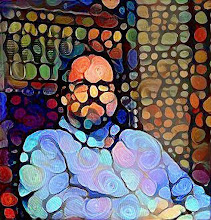Let's talk about Harry Potter for a minute. I'm about half way through the latest book (Harry Potter and the Half-Blood Prince) and, like every other writer in the country, I have wondered just what it is about Rowling's series that has made it so popular.
A conference I spoke at in upstate New York a few years back, had noted children's author Bruce Coville as the Keynote Speaker. (Now, I happen to think that Mr. Coville's books are about as good as the genre gets.) His address spoke of the HP phenomenon. What he said about the Potter books is that they have a higher quotient of CTPP than most books. CTPP. That's "Cool Things Per Page." And he's right, you know. Read through a book and you'll see cool things all over the place...stairs that move around, pictures that talk, headless (nearly) ghosts, sports games played on broomsticks, and magicked items galore! And of course, what better way to attract an average young person's attention but throw what seems to be an average young person in to a SCHOOL to learn magic?
I don't think anyone will ever look on these Potter books as great literature, but then few popular writers will ever have their books considered great literature. LeCarre? King? Grisham? Sheldon? Popular authors. And just what is it about popular authors (and I'd certainly include Rowling in that list) that people buy their books by the millions?
The answer, I think, is that they are good story-tellers. They can tell a story in a way that makes you want to turn the page and see what happens next.
I am very conscious of this thought as I am reading HP6. I realize that I want to go on to the next chapter and find out what happens. I want to know how the character is going to get out of the jam s/he is in. I want to know if the relationships are going to be patched up. I want to turn the page or read just one more chapter. This is excellent storytelling.
I liken it to Louis L'Amour. I never thought I'd read a western novel (and enjoy it), but when I read my first Louis L'Amour book, I had the same reaction as I have with Harry Potter. I wanted to turn the page. Louis L'Amour was a good story-teller. Rowling is a good story-teller. Most best-seller list authors are good story-tellers.
In some ways I am enjoying book 6 in the Potter series more than any of the others, and in equal amounts, I am enjoying it less. I can't help but wonder how much of the book is Rowling's writing and how much is what editors think needs to be there to please the hords of fans.
If you've read the Potter books, I'd be curious as to what you think.
Tuesday, August 16, 2005
Subscribe to:
Post Comments (Atom)

1 comment:
I've read only the first two Harry Potter books. I enjoyed them, but obviously not enough to make me rush out and get the others. I'm glad that kids are reading them, just 'cause I'm glad that kids are reading. There are probably worse things they could be reading.
I like Bruce Coville's "CTPP" analogy. (Is that an analogy?) I can see it. Does that make it bad writing? Certainly not. You admit that Rowling (and others) are good storytellers, that they make you want to turn the page and see what happens next. And yet you also conclude, quite accurately, I suppose, that the Potter books will never be considered "great literature." But why isn't a book told by a great storyteller that makes the reader want to keep reading not "great literature"?
My 12th grade students are often surprised to find that I'll let them read a Harry Potter novel as their outside novel. The 11th grade teacher (who retired after last year) held them to a very restrictive list of "great literature" that most of them disliked. I guess I'd rather have them read something they'd enjoy.
Post a Comment